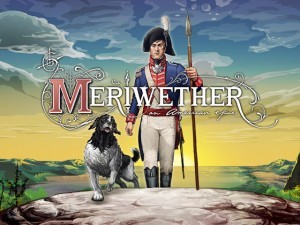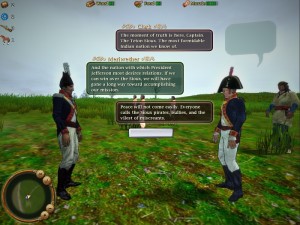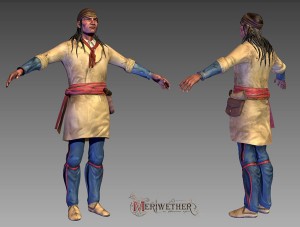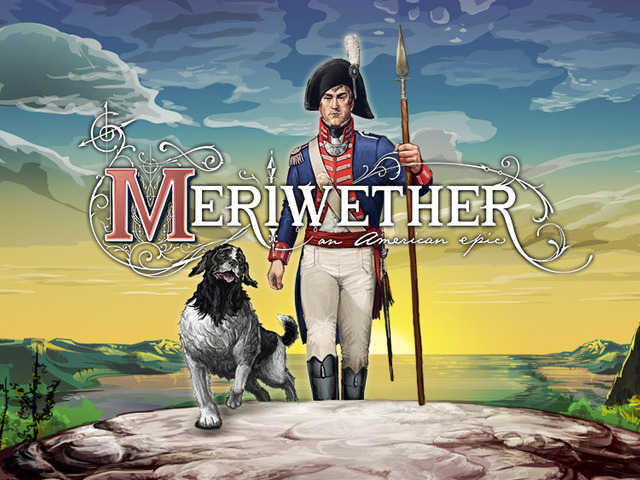 Just over a year ago, in January 2013, Joshua DeBonis received over $40,000 to create an RPG with a pretty intriguing premise. Instead of dragon-shouting or action-barring hoards of fantasy beasts, DeBonis’ game Meriwether: An American Epic takes players back to a time when finding the West coast of the United States was just about as daunting as saving the world.
Just over a year ago, in January 2013, Joshua DeBonis received over $40,000 to create an RPG with a pretty intriguing premise. Instead of dragon-shouting or action-barring hoards of fantasy beasts, DeBonis’ game Meriwether: An American Epic takes players back to a time when finding the West coast of the United States was just about as daunting as saving the world.
I’ll admit, I was one of those obnoxious kids who loved school, so the idea of being part of the Lewis and Clark expedition is enough to have me drooling. But I understand people who need a little more than the promise of trekking over mountains and meeting Sacagawea to get their heart rate up.
For the rest of you, the game’s Kickstarter updates promise some genuinely unique and well-designed gameplay elements. It looks like it will involve a lot of reading and thoughtful action, so it may not be for the hardcore action lovers. But for gamers who want a carefully-paced and intellectual balance of roleplaying and survival, look no further.
As the game nears beta, Josh was kind enough to share some thoughts on some of the unique challenges and features of Meriwether.
[divider] Cliqist : Since RPGs are all about choice and character-building, how do you offer that in a game featuring real people and events that have already happened?
Cliqist : Since RPGs are all about choice and character-building, how do you offer that in a game featuring real people and events that have already happened?
Joshua DeBonis : Tell a story that’s preordained was one of the most difficult challenges for us, but it also led to what we believe is a very unique style, and some innovative mechanics, throughout the game. When making a choice in the game, it’s often less about what to do, and more about how you do it. For example, in dialogue, every choice is associated with a facet of Lewis’s personality: leader, soldier, diplomat, scientist, or melancholy. When you make the choice, Lewis responds with that perspective, but it’s always something believable that he might have done. For instance, if you choose soldier, he might follow regulations, whereas choosing scientist he will look at the facts and do what makes sense. A nice side effect of this mechanic is that you earn a skill point in the chosen facet that can then be spent on related skills.
Cliqist : What creative ways has your team brought variety to a game that could just become repeated hunting, paddling, and diplomacy checks?
Joshua DeBonis : There are two aspects of the game that keep it fresh and exciting, both of which come straight out of the history. First, the story and characters are very intriguing. We’ve chosen Lewis and 6 of his compatriots who are major characters with their own story arcs. Plus there are numerous interesting characters that you meet along the way. The other aspect is about survival: you must provide for your party of 30 men and keep them out of danger, all while making sure you stay on schedule so you don’t get trapped in the Rocky Mountains for the harsh winter.
 Cliqist : Using a historical setting instead of an imaginary one seems to be exciting new territory. Where have you drawn inspiration from, both for the setting and for gameplay mechanics?
Cliqist : Using a historical setting instead of an imaginary one seems to be exciting new territory. Where have you drawn inspiration from, both for the setting and for gameplay mechanics?
Joshua DeBonis : For the setting, we have mostly drawn from the immense amount of literature on Lewis and Clark. Scholars and artists have both investigated practically every aspect of the expedition in incredible detail. For visuals, we’ve largely been inspired by the artwork of Karl Bodmer, Michael Haynes, Charles Fritz, and many others. The game mechanics are inspired by Western RPGs like Mass Effect. Our character creation is inspired by the Ultima series. And the survival aspect and procedural terrain is inspired by Roguelikes–especially games like Don’t Starve.
Cliqist : Who is your favorite character from the game?
Joshua DeBonis : My favorite character is probably Drouillard, or as we call him, the Boba Fett of the game. He is the Corps’ best hunter and tracker. He speaks only when necessary. And he is stealthy, deadly, and a bit of a loner.
 Cliqist : What is one of the game’s unique mechanics that you’d be most excited to tell someone about?
Cliqist : What is one of the game’s unique mechanics that you’d be most excited to tell someone about?
Joshua DeBonis : I think our melancholy mechanic is very interesting. Every time you make a choice in dialogue, the facet for that choice gets covered in melancholy–a black bile bubbling all around it that gunks it up. After choosing that facet three times it will be completely covered in melancholy and locked out and so you can no longer choose it. However, when you choose an option with the melancholy facet, it purges this bile from all the others. But there are ramifications–when you make this choice, Lewis lets his dark side show and you will see his temper, his frustrations, or maybe on a good day, just his introspection. Timing this release so you don’t dig yourself into a deeper hole is very important!
Cliqist : How much of the game’s landscape is procedurally generated vs. not? What kind of replay value do you foresee?
Joshua DeBonis : Almost all of the landscape is procedurally generated, although for certain key areas we have “locked it in” to a particular seed so we could do some more traditional level design around that space. These “locked-in” levels tend to be focused on the narrative and are usually not places where you can die easily, so replayability isn’t much of an issue. However, as you are travelling over large swaths of land, the gameplay shifts to be more about resource management and survival. At this point, it is very replayable, and when you die, you’ll need to start that area over, but the terrain and its contents will have changed. We think this is important in reflecting the sense of discovery that’s so important to the concept of an expedition.
 Cliqist : What is one of your favorite facts you have learned about the Lewis and Clark expedition while making this game?
Cliqist : What is one of your favorite facts you have learned about the Lewis and Clark expedition while making this game?
Joshua DeBonis : In his journal, Clark spells “mosquitos” at least 19 different ways: mesquestors, misquestors, misquitor, misquitoes, misquitors, misqutors, misqutr, missquetors, mosquiters, mosquitors, mosquitos, muskeetor, musqueters, musquetors, musquiters, musquitoes, musquitors, musqueters, and musqutors.
The story is filled with so many other weird, funny, quirky, and disgusting elements–I can’t wait to share them with the world through this game.
[divider]Thanks to Joshua for taking the time to answer our questions! To learn more about Meriwether be sure to keep an eye on the game’s Kickstarter updates.



